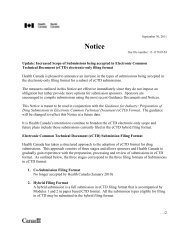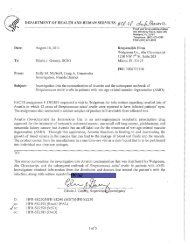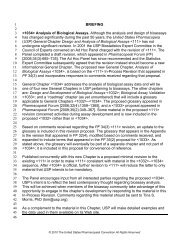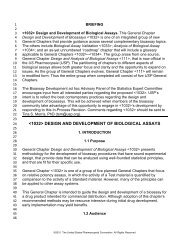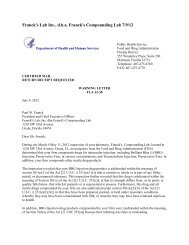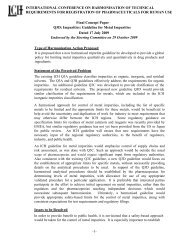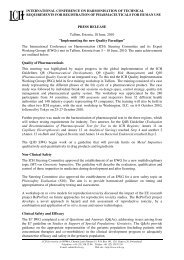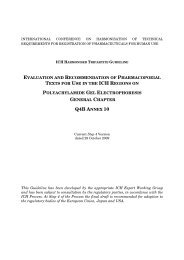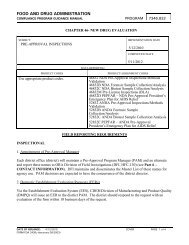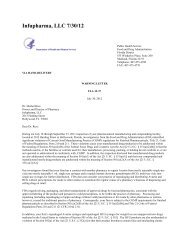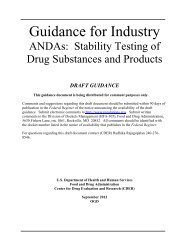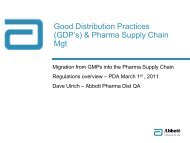BEPBA Bioassay Conference Agenda - IPQ
BEPBA Bioassay Conference Agenda - IPQ
BEPBA Bioassay Conference Agenda - IPQ
You also want an ePaper? Increase the reach of your titles
YUMPU automatically turns print PDFs into web optimized ePapers that Google loves.
BEBPA’s 3nd Annual Biological Assay <strong>Conference</strong><br />
Main <strong>Conference</strong>, Day 1: 30 September 2010<br />
8:00-8:15 Open of <strong>Conference</strong>: Welcome and BEBPA<br />
Update<br />
Laureen Little, PhD, Principal Consultant, Quality Services<br />
Functional Assays for Antibodies: ADCC and Beyond<br />
Session Chairs: Hans-Joachim Wallny, PhD, Novartis and<br />
Xu-Rong Jiang, Ph.D., M.D., MedImmune, LLC<br />
Keynote Address<br />
8:15-9:15 Development, Validation and Real-life Experience<br />
of a Potency Assay for an Anti-Cytokine mAb<br />
A potency assay was developed to support release and stability<br />
testing of GMP drug substance and drug product of a fully<br />
human monoclonal antibody targeting a cytokine. The potency<br />
assay is based on inhibition of a transcription factor essential<br />
for biological function of the cytokine. The presentation will<br />
focus on assay development and validation, the establishment<br />
of procedures to monitor assay performance, as well as issues<br />
that became apparent during routine use of the assay and how<br />
these were addressed.<br />
Dr. Thomas Millward, Group Head Bioanalytics, Novartis<br />
Biologics, Switzerland<br />
9:15-10:00 A Strategy for Assessment of Effector Functions<br />
of Therapeutic Monoclonal Antibodies (this is an<br />
overview of the Fc effector function characterization<br />
whitepaper co-authored by experts from Amgen,<br />
Genentech, Biogen Idec, Merck, Eli Lilly & MedImmune)<br />
The Fc region of therapeutic monoclonal antibodies can play<br />
an important role in safety and efficacy. Although much is<br />
known about the structure-activity relationship of antibodies<br />
and the factors that influence Fc effector functions, it remains<br />
unclear how manufacturers should assess and control Fc functionality.<br />
We present a control strategy.<br />
Dr. Xu-Rong Jiang, Associate Director, MedImmune, US<br />
10:00—10:30 Morning Break<br />
10:30-11:15 Correlation Between Binding and Cell-based<br />
Functional Potency Assays<br />
Dr. Svetlana Bergelson, Associate Director, Biogen Idec, US<br />
11:15-12:00 Functional Analysis of Therapeutic Monoclonal<br />
Antibodies Using Surface Plasmon Resonance<br />
(SPR) and Flow Cytometry (FC)<br />
ADCC is an important mode of action for many monoclonal<br />
antibodies but these assays are challenging to develop. We<br />
showed binding of the prototypic humanised antibody alemtuzumab<br />
to the critical Fc gamma RIII receptor, measured by<br />
SPR and FC, correlates with physiological activity measured<br />
by ADCC. Glycoengineered antibodies with different levels of<br />
binding activity were used to show the sensitivity and specificity<br />
of the method. The Fcgamma RIII ligand binding assays<br />
provide a functionally relevant indicator of product quality for<br />
batch release and stability testing.<br />
Dr. Alice Harrison, GMP Services Manager, BioAnaLab, UK<br />
BioAssay Statistical Tools<br />
12:00-1:30 Luncheon<br />
Three Ways to Register<br />
www.BEBPA.org Telephone: +1-916-729-0109<br />
Chair: Dr. Stanley Deming, President, Statistical Designs<br />
1:30-2:15 Specifications and Fundamental Statistics<br />
As ICH clearly points out, the only rational basis for setting<br />
specifications is based on fitness for use, considerations usually<br />
involve safety and efficacy. From Q6B: "Acceptance criteria<br />
should be established and justified based on data obtained<br />
from lots used in preclinical and/or clinical studies.." The common<br />
practice of setting specifications based on current performance<br />
of an existing process without evaluating fitness for<br />
use carries two risks: risk to the customer, and risk to the<br />
manufacturer. Further, the common use of arbitrary numbers<br />
of "sigmas" to set simple specifications (for example, in batch<br />
release testing) often involves risks that are inappropriately<br />
large for the business application. "Specifications for the<br />
Chemical and Process Industries...", ISBN 0-87389-351-4, is<br />
recommended.<br />
Dr. Stanley Deming, President, Statistical Designs, USA<br />
2:15-3:00 Managing Quality Assessment via Study Design<br />
<strong>Bioassay</strong>s are an integral part of the quality assessment required<br />
for manufacturing pharmaceutical and biological products.<br />
<strong>Bioassay</strong>s differ from chemical methods in their inherent<br />
variability stemming from the influences of multiple operational<br />
and biological factors. The influence of these factors can be<br />
managed through strategic study design after identification<br />
during development and validation. Both randomization and<br />
replication are utilized to improve measurement reliability.<br />
Release assays may be designed to manage the risk of OOS<br />
results, while stability studies are designed to minimize the<br />
uncertainty associated with the measurement of the degradation<br />
rate of the product.<br />
Timothy Schofield, Director, GlaxoSmithKline, US<br />
3:00—3:30 Exhibit/Poster and Refreshment Break<br />
Multiplex Assays<br />
Increased pressure on researchers to gain greater understanding<br />
of products, protein interaction, identification of markers<br />
etc has led to a number of emerging technologies offering<br />
‘multiplexing’ of assays. Multiplex assays are designed to generate<br />
simultaneous measures from a single sample against<br />
multiple analytes. This session will describe the promises and<br />
pitfalls of ‘multiplexing’ and describes two case studies on the<br />
development and validation of multiplexed assays.<br />
Session Chairs: Bassam Hallis, PhD, HPA and Thierry<br />
Pascal, PhD, GSK<br />
3:30-4:15 Promises and Pitfalls of multiplexing!<br />
Dr. Bassam Hallis, General Project Manager, HPA, UK<br />
4:15-5:00 Validation of a Multiplex Luminex ImmunoAssay<br />
(MLIA) for Assessment of the Immunogenicity of Bordetella<br />
Pertussis Vaccines<br />
Dr Nathalie Durant,GlaxoSmithKline Biologicals, Belgium<br />
5:00-5:45 Validation of the HPV Genotyping Assay<br />
Bernhard Kleter, DDL Diagnostic Laboratory<br />
5:45 No Host Networking Reception in Bar<br />
Fax:1-916-729-2602



